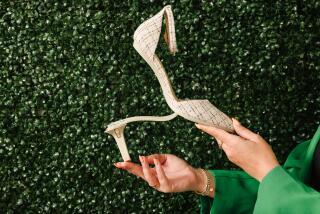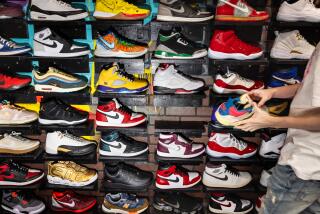Stock Price Soars as Hiking Boot Makers Hit Their Stride : Marketing: The next goal for Taiwan’s Chen brothers will be to expand their Kingmaker Footwear beyond its niche.
- Share via
ZHUHAI, China — In the parking lot of Kingmaker Footwear Holdings every morning, next to the hundreds of battered bicycles lined up in neat rows, two thousand young women dressed in blue smocks do windmills and deep knee bends.
Their exercises done, the women proceed double file into the factory, climb up the stairs to a vast workroom and take their places at work desks on the production line. Enormous fans hang from the ceiling to cool off the workers and blow away fumes from glue. The sewing machines roar.
It’s a classic scene in Asia, one that’s made millions for many companies. And that is what it’s doing now for Kingmaker, which specializes in making hiking boots for brand name retailers like Bass, Frye, Reebok and Hush Puppies. A small player in the Asian shoe-making industry, Kingmaker’s 104% surge in share price since May illustrates how fast a company can make a mark in this super-competitive industry--and the challenges of outgrowing a niche to become a major competitor.
“If the business gets attractive enough, the big guys come in,” said Kent Chan, an analyst for Salomon Brothers. “And if the big guys do that, where does Kingmaker go? It’s a hard business to stay competitive in, long term.”
For now, Chris and Mickey Chen, the brothers who started Kingmaker 15 years ago in Taiwan, are basking in the company’s standout performance of last year.
While most small shoe-making companies saw profits drop as cutthroat competition cut into market share and the cost of plastic and leather rose, Kingmaker racked up 37% higher earnings for 1994.
With 1994 sales of HK$493 million and a market capitalization of $500 million, Kingmaker is dwarfed by its largest rival Yue Yuen Industrial, which is worth HK$4.3 billion and sold HK$4.1 billion worth of shoes last year. About four other Hong Kong shoe companies are Kingmaker’s size in sales and market value, though none have Kingmaker’s claim on the “rugged footwear” niche.
The company has come to dominate the niche because hiking boots (as rugged footwear is better known) are just a little too complicated to make, and a little too small a market, to interest the likes of Asia’s largest shoemakers.
*
A decade ago, Chris and Mickey Chen saw that with competitive pricing, an extra-vigorous sales force and a willingness to put in the effort to make hiking shoes, Kingmaker would have itself a niche. They’ve worked it ever since.
In 1994, while similar sized companies lost market share as orders for athletic shoes were spread out among more and more manufacturers, Kingmaker enjoyed steady orders from longtime customers that wanted their annual quota of hiking shoes, said Philip Kimmel, the company’s general manager.
So far, so good, but some analysts are worried.
Today it’s fashionable to wear hiking boots to fancy restaurants, to piano recitals, even to church. What happens to Kingmaker when fashion dictates that the masses put back on their high heels and wingtips?
Not a problem, says Kingmaker. A hiking boot is to an ordinary shoe what a Mercedes is to a moped, they say.
“If you can make a hiking shoe, you can make any kind of shoe,” says Chris Chen, the company’s president.
If Kingmaker faces long odds in protecting its comfortable niche against larger competitors, it’s also true that Chris Chen’s brand of bravado has successfully guided the company.
Born in the central Taiwanese town of Lukang, the Chen brothers grew up in a poor family. Their father made small religious shrines for local villagers.
Chris, the elder brother by nine years, grew up during the Japanese occupation of Taiwan. Unable to get an education beyond high school, he got a job at a food canning factory in his teens. Later, he joined a trucking company as a manager, buying shares gradually over the years until he became the company’s second-largest shareholder.
Also with savings from the trucking job, Chris helped put Mickey through the Tanshui Commercial College in Taipei. After graduation, Mickey joined a shoe-making company as a salesman, gradually working his way up to sales manager. After four years, the company was bought out in 1980, and the new owners offered Mickey shares in the company if he stayed.
Should I buy in? Mickey asked Chris.
Chris’ answer: Why not start our own company?
*
With $200,000 scraped together from savings, the sale of a family plot and a loan from a relative, the brothers were off. They landed an order for plain canvas dancing shoes from Thom McCann, and hired 150 workers immediately.
The company thrived the next four years, growing as Taiwan’s economy grew. Chris and Mickey realized, though, that in the long term they were doomed if they kept making the same sorts of shoes as their bigger, better-capitalized competitors.
Athletic shoes were coming in big then--jogging shoes, tennis shoes, lots of glitzy numbers with overlapping colored patches that were all essentially the same garden variety sneaker. Kingmaker could stand out, the Chens realized, if it specialized in a high-value, high-profit-margin product.
From his days of compulsory service in Taiwan’s army, Mickey remembered how uncomfortable his leather boots were.
They would specialize in hiking boots, the brothers decided, just the sort of higher-value niche they’d been looking for.
Using money saved during the company’s first four years, Kingmaker made the quantum leap into hiking boot production in 1984. They hired 100 engineers, technicians and designers to staff an expanded R&D; department and bought the machinery to make the “lasts,” or molds, for hiking boots.
It worked, and orders surged. But by 1987 the company was facing another challenge brought on by its own success.
Taiwan’s booming economy had pushed wages up, a death sentence for companies that can’t find ways to bring costs down again. Salaries soared so high that Kingmaker’s profit margins, along with those of most other shoe-making companies on the island, practically disappeared.
Many other companies moved their factories to low-wage Indonesia and Thailand. The Chen brothers picked China, where not only were wages far lower than Taiwan, but as Mandarin-speakers,
*
Factory workers at the company’s Zhuhai factory make an average 700 yuan ($84) per month, about the same as other low-wage factories in Southeast Asia and one-tenth the wages a similar worker would get in Taiwan. That may sound like meager wages, yet consider that most of Kingmaker’s workers come from northern Chinese provinces such as Hunan, Wubei and Jiangxi, where the average factory wage is 200 yuan per month.
Today, growing beyond its niche in hiking boots is Kingmaker’s next critical challenge.
For analysts like Chan of Salomon Brothers, who wonder where earnings growth will come from in the future, the company says that in addition to continuing manufacture of “rugged footwear,” growth will come from two main areas.
The first is what Kingmaker believes will be the next mega-star in the global shoe market--walking shoes with extra support for aging baby-boomers.
“Baby boomers are taking brisk walks now, instead of jogging,” Kimmel said. “We see a stronger market for comfortable footwear with more padding and support.”
More to Read
Inside the business of entertainment
The Wide Shot brings you news, analysis and insights on everything from streaming wars to production — and what it all means for the future.
You may occasionally receive promotional content from the Los Angeles Times.










